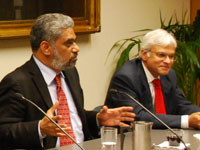Registration
You will receive an email confirming your registration.
IMGXYZ1472IMGZYXThe emergence of China and India as great powers is transforming the world, affecting global security, the economy, and the physical environment. These two nations have an increasingly important role to play in a variety of issues, from traditional security matters such as political-military affairs and military modernization, to new challenges and global issues like energy security.
Against this complex international backdrop, C. Raja Mohan and Alyssa Ayres, co-editors of the book Power Realignments in Asia: China, India, and the United States, along with contributors Richard J. Ellings and Carnegie’s Ashley J. Tellis, discussed Asia’s security politics, the U.S. response to the rise of China and India, and the future of the new U.S.–India relationship.
Asia’s security politics: As Ayres noted, while India and China’s economic and trade relationship is seen positively by both countries, their security relationship is marked by suspicion.
- Mohan attributes this primarily to the border disputes in Aksai Chin and Arunachal Pradesh, which surface regularly and challenge any attempt at normalizing the Sino-Indian relationship.
- Both countries have invested little in knowing each other, culturally and geopolitically, observed Mohan. Only once the two understand each other can there be scope for progress.
U.S. response to the rise of China and India: Ellings emphasized that “a rising China will be the core issue in international affairs in the 21st century.”
- India’s rise will also be significant given its geographical position, and alliance with the United States.
- While the balance of power will inevitably shift towards Asia, it will be a slow and hopefully stable transition. The United States still has strong allies in the region and will continue to have clout in global affairs.
Future of the new U.S.-India relationship: Tellis was cautiously optimistic after Prime Minister Singh’s visit to Washington.
- Indian criticism of the visit’s lack of tangible outcomes was the product of an unfair comparison to Singh’s 2005 visit, which led to an incorporation of India in the global nuclear regime. The “ordinariness” of the visit is telling of its success and of how far the relationship between the two nations has come.
- The visit confirmed that the existing positive bilateral relationship is a reflection of core principles rather than the leanings of a specific administration. It also showed that there is an alignment—albeit not perfect—of fundamental strategic goals between the two countries, that there are areas of potential cooperation such as on climate change, and finally, that the two current leaders seem to genuinely like each other. In these ways, the visit was a success, and bodes well for the future bilateral relationship.
